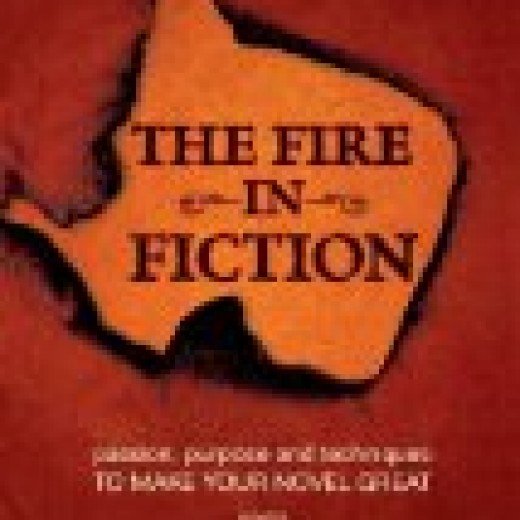Getting Started with Your Writing Practice: Where Ideas Come From by Martin Haworth
 Let’s welcome back monthly columnist Martin Haworth as he shares with us “Getting Started with Your Writing Practice: Where Ideas Come From.” Enjoy!
Let’s welcome back monthly columnist Martin Haworth as he shares with us “Getting Started with Your Writing Practice: Where Ideas Come From.” Enjoy!
***
Even though they want to be writing, many writers have a hard time coming up with ideas. Then they’re not writing and get upset about that, and don’t even start. A bit of a vicious circle and a painful one too.
I have some ideas that may help you if you find yourself in this situation. But first a story…
In a different life –when I’m not working on fiction, I spend time helping middle managers understand that the roles they play in leading their teams are pivotal to the performance outputs of that team. Their attitudes, behaviours, and beliefs are critical to the team’s success. Whatever they as a leader do– where they as an individual come from– significantly influences the success or otherwise in those around them.
I often share with these leaders the philosophy of Carole Dweck, whose influential book, appropriately called Mindset, has become the go-to resource for how we all set ourselves up in our lives.
Dweck considers that we are all, to a greater or lesser extent in a ‘Growth’ or ‘Fixed’ mindset, and this influences the way we see the world. It is about how our behaviours can influence the work we do in constructing our lives. It’s a classic swing of who we choose to be: ‘have/have not’; ‘half empty/half full glass’; ‘can/can’t’.
Because being willing to take on a little risk and do something differently is a choice we make, initially subconsciously — and then -– consciously, about who we want to be.
Naturally, from our genes; our upbringing, and our place in our tribe, we will veer to one side or the other—a fixed mindset or growth mindset, yet simply appreciating that we are choosing can enable us to practice to ‘switch sides’ in our mindset and see what the world looks like – albeit initially fleetingly for some people – if we are more open to possibilities.
I’ll finally come to the point.
How does this affect ‘Where Ideas Come From?”
For the extreme ‘growth’ mindset folks, they will find themselves overwhelmed with topics to consider writing, and in extreme cases, may freeze because they have so many ideas. They cannot make a choice, find it too hard to choose, and therefore fail to write at all!
These ideas will come from a whole raft of opportunities. Like newspapers; interactions in shops; personal history; the natural world; a walk in the park; a character on a bus! So many potential stories – and so little time to write them. They – like I, can switch on ‘idea mode’ in the moment – and always find something.
One of my stories was prompted by the flight of a woodpecker I startled on a walk in a nearby forest.
For those who simply don’t notice these ideas, there is a reason. There is nothing wrong with your caution; your doubts. There is nothing wrong with you in your way of thinking and perceiving the world around you. It is a survival behaviour – risk aversion – that protects you. And yet, with a little practice, you can become more open. More ‘growth’, simply by trying on a few ideas to loosen you up.
Here’s the challenge. Sit still. Look out of your window. Find one object and ask yourself the perennial writer’s question.
What if?
Find 10 answers…
Then find 10 more, because then you’ll be digging into the subconscious that allows you to access more your right-brain (non-linear, non-verbal, visual side) and therefore be open to wider possibilities.
Be as revolutionary, rebellious, and renegade as you like. Be impossible.
The impossible is where the best stories come from. Trust this. You ARE able to find a story in anything and everything.
Choose any one of your 20 ideas and write as short story. Keep it as short as you like (but 150 words is a nice starting target – aim to use the three-act structure if you like).
Do this for a week every day. Each day choose something – anything – new. Do the 20 wacky ‘what-if’ ideas that spin off the object – or article – or whatever floats your boat.
Next week do another cycle, this time writing twice as much.
Have the fun that writing is supposed to be.
Extra challenge: Do this for a month, doubling each week (by week 4 you’ll be up to 1,200 words each day, tough but doable. Maintain for just this one week.)
You’ll be much better set for the future, for it takes about 30 days for a new behaviour to embed. You’ll have become more open to possibilities and that will enhance your capability to see ideas all over the place.
A behaviour of ‘I can’ rather than ‘I can’t’. One that allows you the freedom to not be judged by anyone and yet, make the progress that you need.
The ‘growth’ rather than the ‘fixed’.
True, you might find that making the link between a ladybird on a leaf outside your window and the next Jack Reacher to be tenuous.
Yet again, if you force it, who knows?!
Lee Child only ever starts with an inkling of an idea (Reacher Said Nothing by Andy Martin.)
If you can’t be bothered to try this, that’s all right as well. You decide.
The written word is, after all, only a set of words cobbled together in a certain way to create a story. All those words are merely a series of ideas that fit – sometimes horribly and yet with experience and practice, sometimes rather well indeed. Even if your writing starts off being awful, if you get a set of words on the page, you will always have the benefit of editing it into shape.
When I sat down to write this, I had nothing to start me off, except the inclination that ‘Mindset’ might matter.
Read on for my example of my List of 20 story generation exercise.
I entered the supermarket, a helicopter flew over (really!)…
What if…
- It began to hover
- The engine began to smoke
- It landed
- Men began to jump out
- A rocket hit it
- Another helicopter was following it
- It crashed in the car-park/the supermarket
- A police siren began to wail
- People began to rush out of the supermarket
- It began to glow
And Ten More
- An alien spacecraft began to suck the helicopter in
- It began to display a banner behind it
- It started to do an aerobatic display
- I decided to begin pilot training
- My father died in a helicopter accident
- It was my helicopter that should have been in a hangar
- I had scrapped that helicopter last week
- Things began to be thrown from the helicopter
- Battle-clad soldiers began firing at it from the car-park
- The arrival of such a helicopter was foretold in scriptures as the return of Christ
Bonus Five More!
- It was the first helicopter ever seen
- A child began to scream at the sight of the helicopter
- On the side of the helicopter was a brand of ice-cream
- Rain poured from the helicopter
- As it approached, the helicopter turned into a huge eagle
Now your turn. Post your list of 20 of story generation idea in the comments; post your experience using this tool and what you learned; or share one of the fun ideas you wrote about. I’d love to see what you discovered.
***
ABOUT MARTIN HAWORTH
 Martin Haworth is a coach, trainer and would-be fiction author with a manuscript that ‘needs work.’ He lives in Gloucester, England and has two grown up kids and three grandchildren. He loves walking, travel, and supporting Burnley Football Club. Check out his website at http://martinhaworth.com.
Martin Haworth is a coach, trainer and would-be fiction author with a manuscript that ‘needs work.’ He lives in Gloucester, England and has two grown up kids and three grandchildren. He loves walking, travel, and supporting Burnley Football Club. Check out his website at http://martinhaworth.com.






